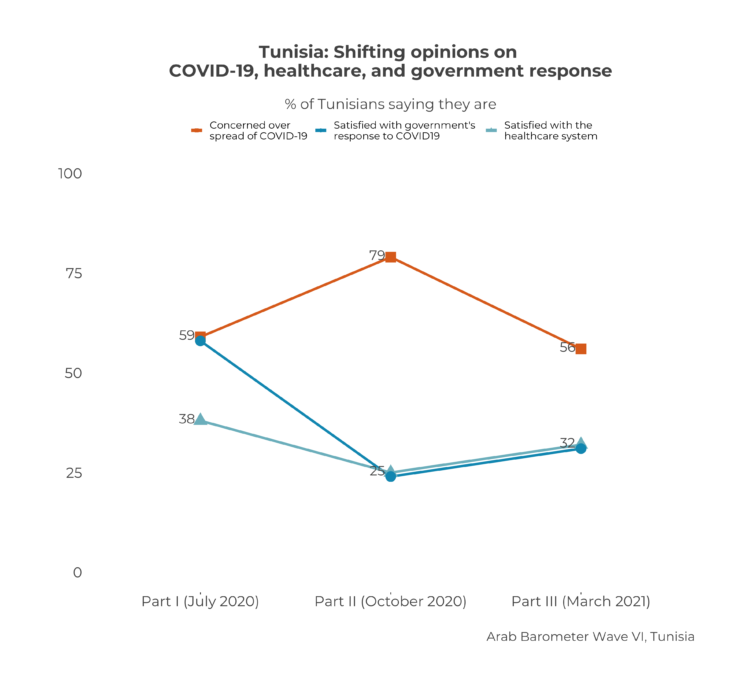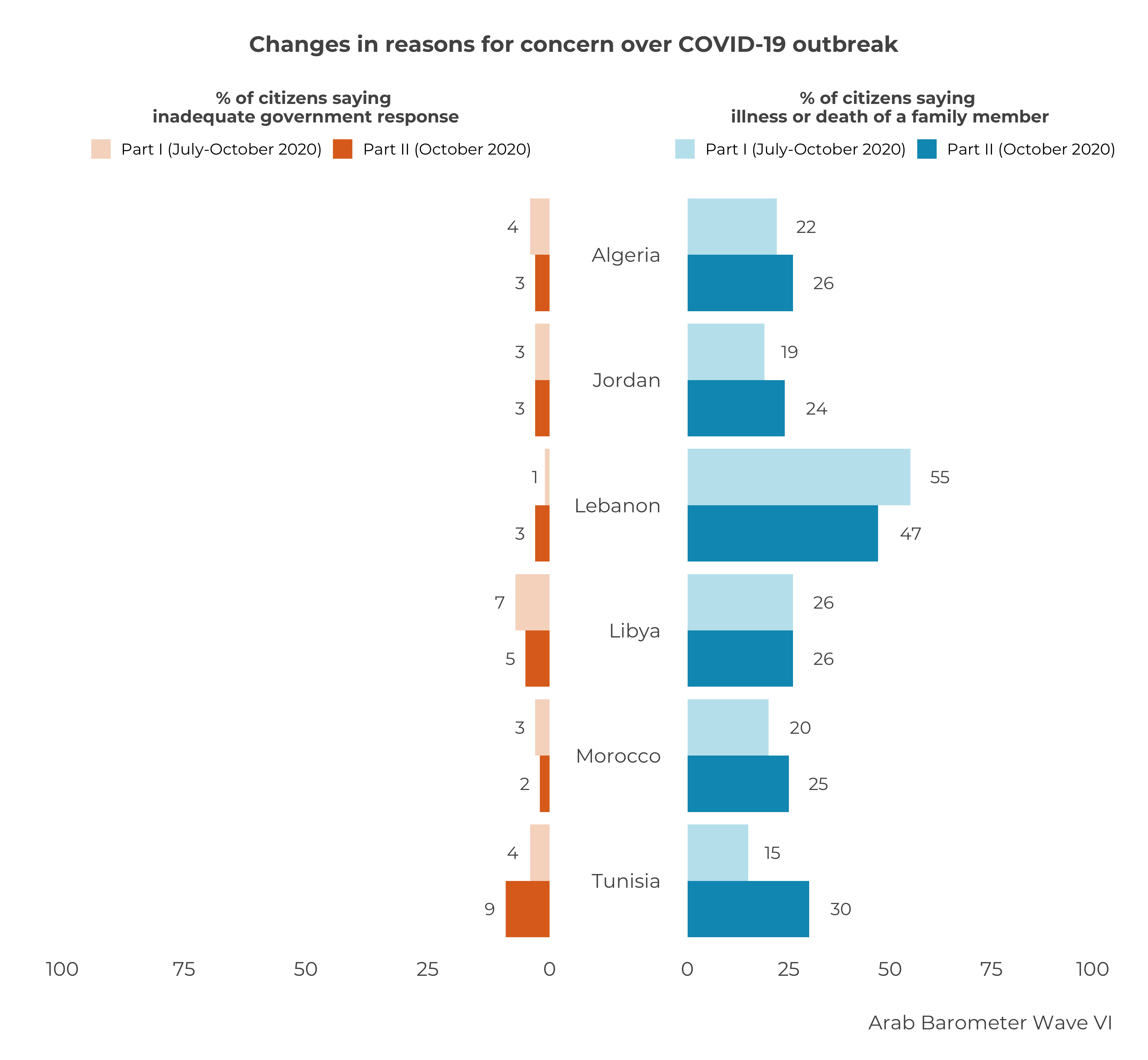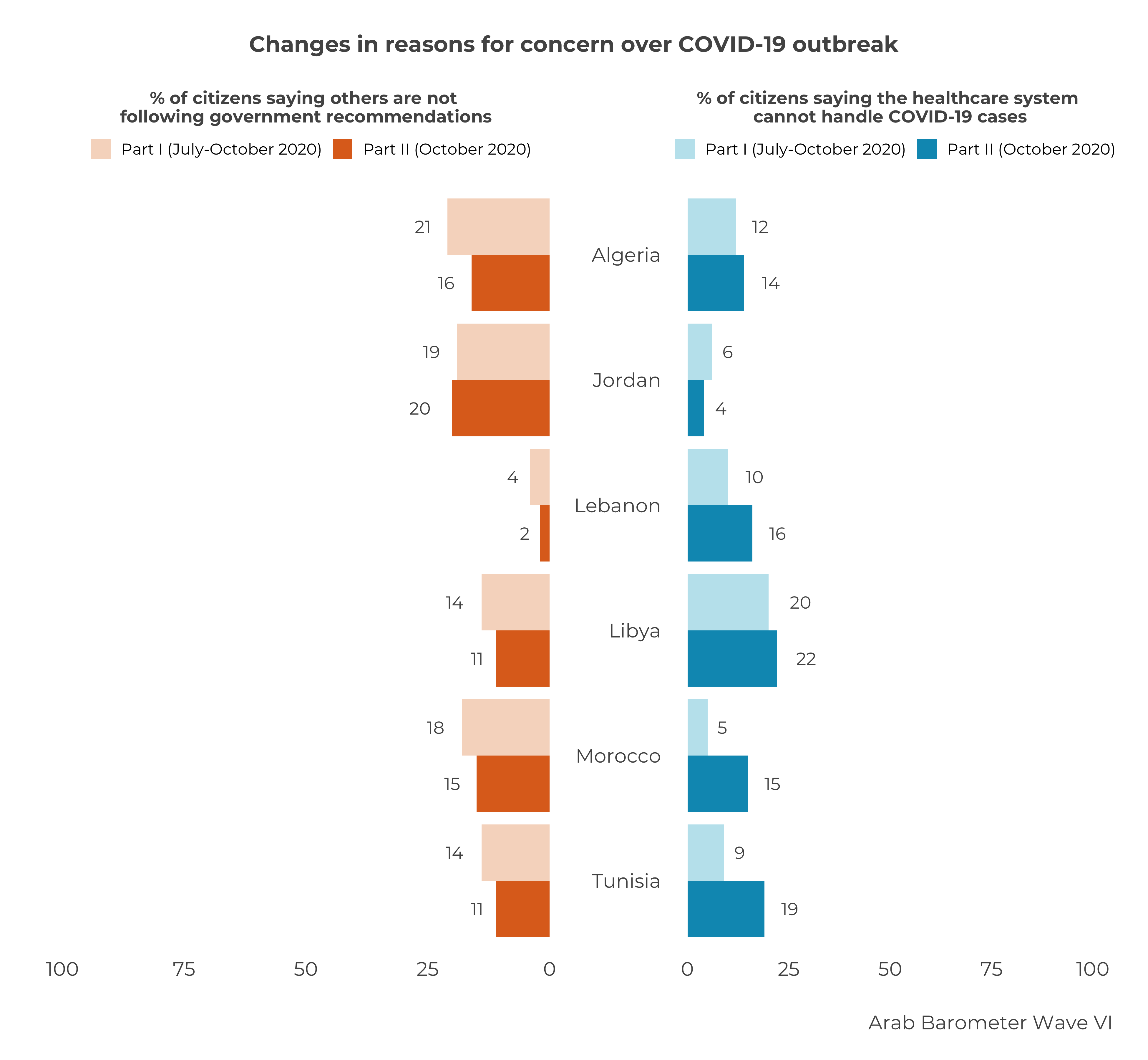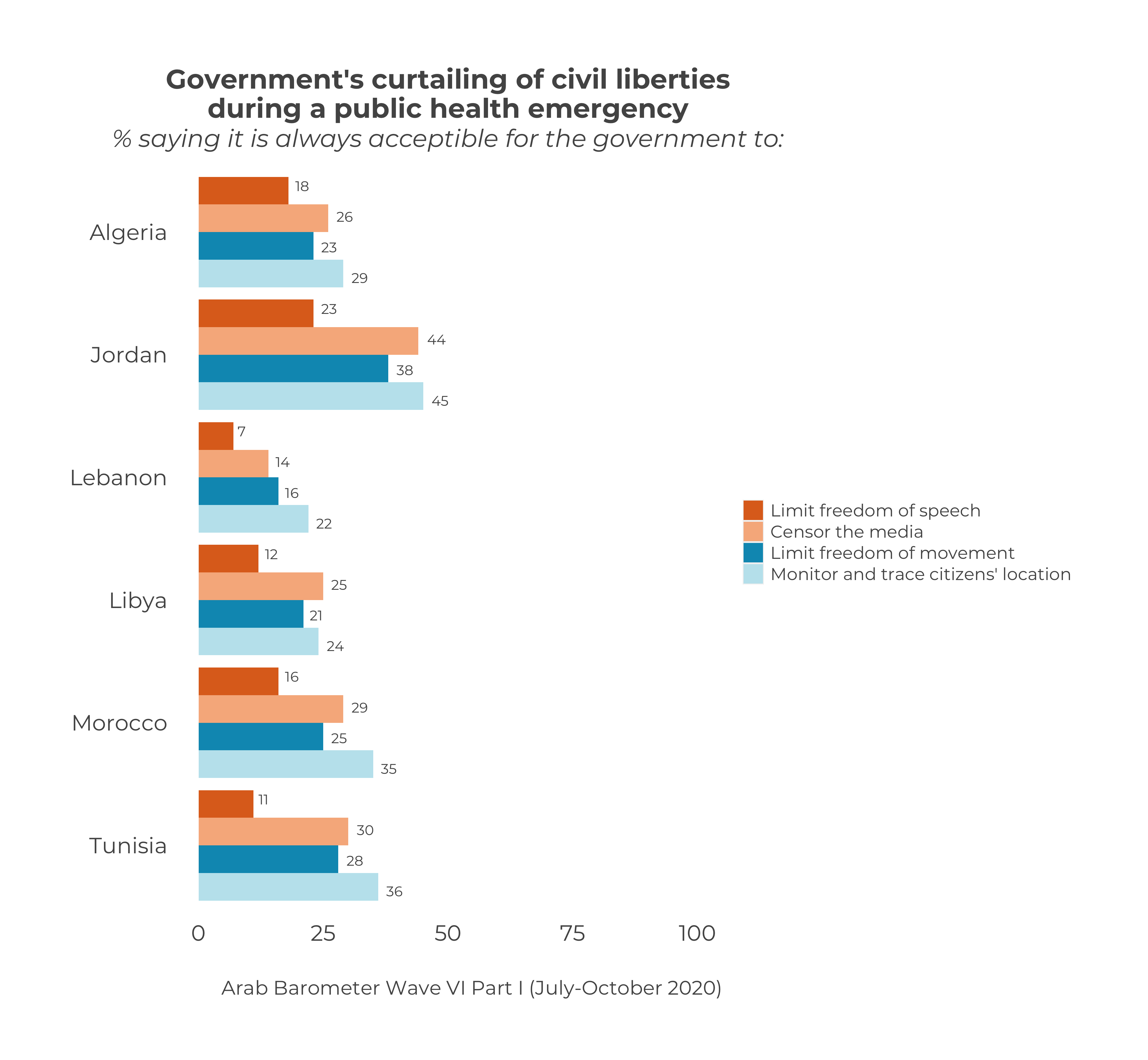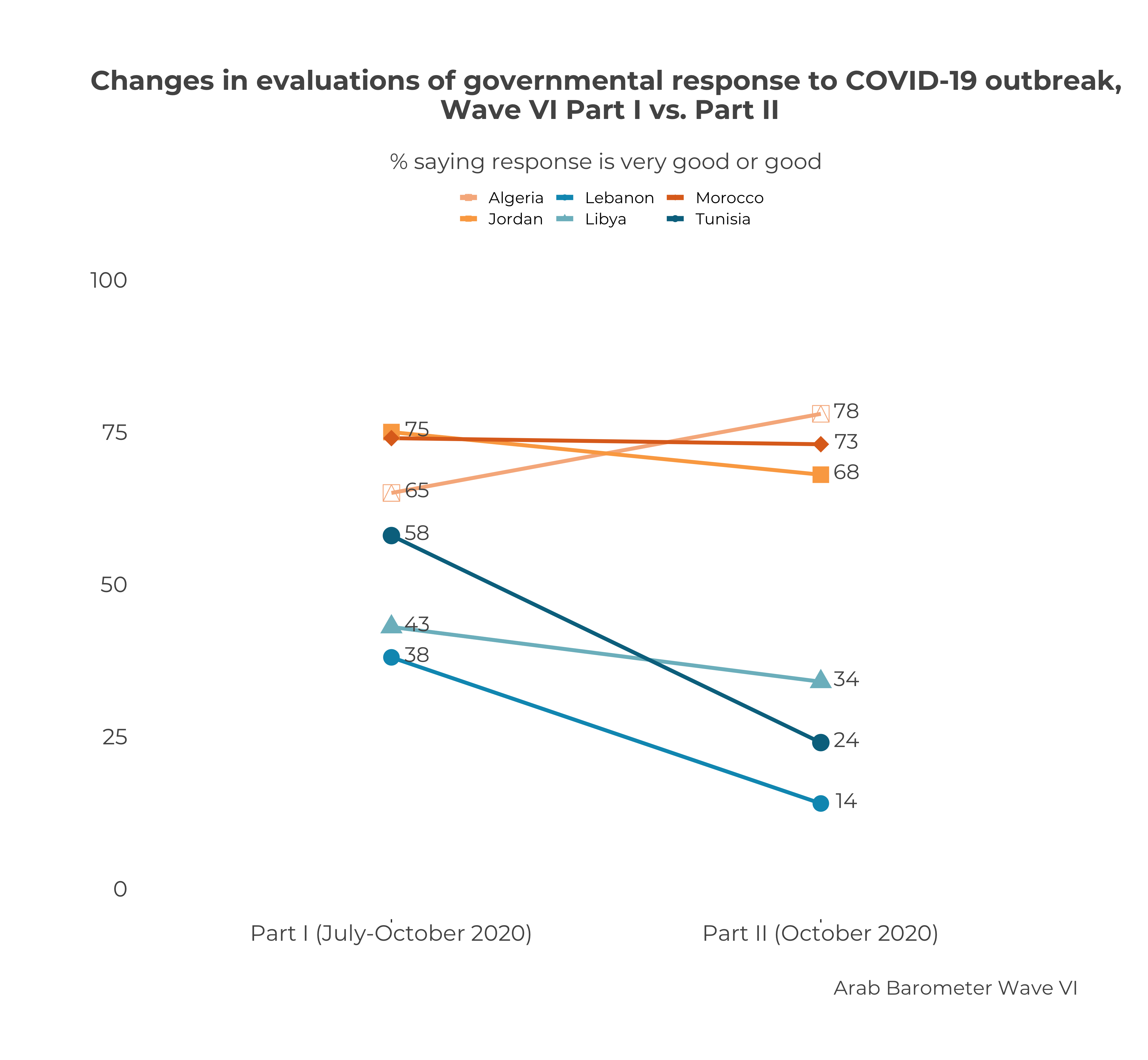Of all the crises that have plagued countries in the Middle East and North Africa (MENA) in the past decade, the COVID-19 pandemic stands out in at least one regard: the government in each country was not its primary cause. Yet managing the pandemic was the government’s primary responsibility, and citizens in several MENA countries have mixed appraisals of how their governments have fared. Where citizens in Algeria, Jordan, and Morocco are relatively satisfied with the governments’ response to healthcare side of the crisis, citizens in Lebanon, Libya, and Tunisia have been left wanting.
The pandemic may yet be an opportunity for the region’s governments to press the reset button on state-society relations, and it is perhaps too soon to tell whether or not governments have managed to do so. But ironically, and regardless of their intentions, governments’ abilities to govern were stilted by their past transgressions: the pandemic further exacerbated preexisting problems often engendered in the first place by governments’ negligence at best and corruption at worst. The healthcare sector is no exception.
|
Arab Barometer Wave VI Fielding Dates in 2020 |
||
| Part I | Part II | |
| Tunisia | 07. 24 – 07.28 | 10.06 – 10.15 |
| Morocco | 07.28 – 08.04 | 10.07- 10.15 |
| Algeria | 08.15 – 09. 05 | 10.12 – 10.19 |
| Libya | 08.15 – 09.29 | 10.19 – 10.27 |
| Jordan | 09.19 – 09.25 | 10.06 – 10.30 |
| Lebanon | 09.29 – 10.09 | 10.12 – 10.25 |
Across the six countries surveyed in Arab Barometer Wave VI Parts I and II, concern over the spread of COVID-19 is high and either stayed high or increased between summer and fall of 2020. The upward trend in concern is most pronounced in Tunisia and Morocco, where there was a 20- and 10-point increase, respectively, followed by smaller, 5-point uptick in Jordan. Majorities continued to express concern in Algeria, Lebanon, and Libya, though slight changes were statistically insignificant in these countries.
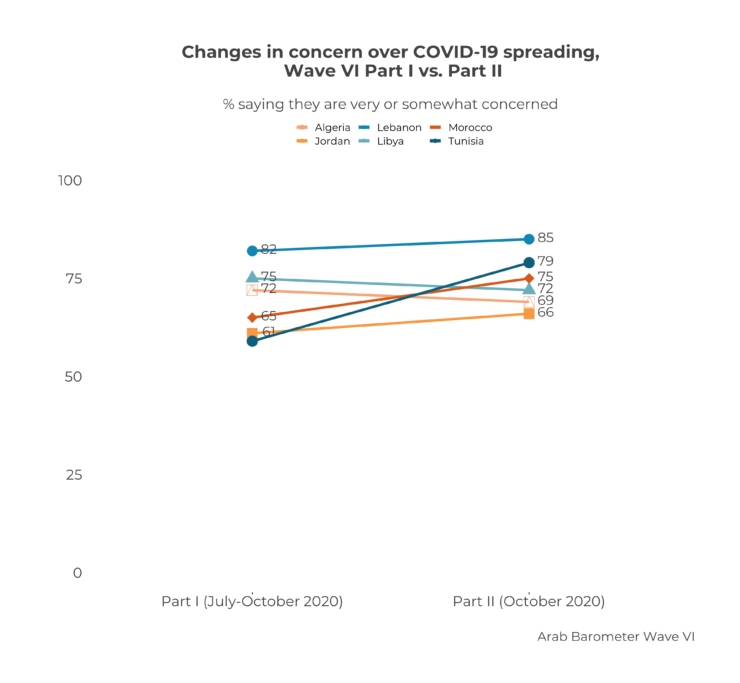
More telling than the change in or fact of citizens’ concern, however, is the rationale that underpins it—and the rationale that does not. Three countries in particular saw their infection rates skyrocket between the last day of fielding of Wave VI Part I and the last day of fielding in Part II. The number of infections rose from 1,468 to 34,790 in Tunisia; from 7,211 to 69,360 in Jordan; and from 27,217 to 163,650 in Morocco. Commensurately, from July through the end of October 2020, the plurality of citizens across all countries report that they were first and foremost concerned about having a family member fall ill or succumb to the coronavirus. The shares range between 24 percent in Jordan to 47 percent in Lebanon in Part II. Women, who are traditionally household caretakers, are more likely to choose this reason than men.
Notably, only small minorities (less than 7 percent in all countries in Part I, less than 9 percent in Part II) reported that the government’s inadequate response was the primary reason for their concern, yet this is hardly indicative of tacit support for all governmental actions in responding to COVID. With systematic problems that simply could not be addressed without systematic change, many regional governments resorted to a familiar tool; the state of emergency law, which countries from Morocco to Jordan enacted in the wake of the pandemic. Weary of past slippery slopes and indefinite extensions, minority shares of citizens report they would tolerate such measures as censoring the media and monitoring and tracing citizens’ locations in the name of public safety. Overall, Jordanians have the highest tolerance threshold for such measures, with up to 44 and 45 percent respectively saying it is always acceptable for their governments to do so.
Instead, over time citizens have shifted their concern from frustrations with their compatriots for not following governments’ guidelines to concern over whether the healthcare systems in their countries can withstand the pressure of mounting COVID cases. While the proportions of citizens citing the health of the healthcare system are small across the board, the changes over time are significant: the share triples in Morocco; doubles in Tunisia; and grows significantly larger in Lebanon.
The increasing concern about the health of the healthcare system is matched by decreasing faith both in it and in the government’s handling of the COVID-19 crisis. Nowhere is this pattern more apparent than in Tunisia, Lebanon, and Libya, where concern was high and rising while appraisals of the healthcare system were low and falling. Lebanon and Libya were experiencing the pandemic against the backdrop of ongoing crises: the financial collapse and Beirut port explosion in Lebanon and competing governments with ongoing armed territorial disputes in Libya.
Lebanon has both the highest level of concern over COVID19 spreading (upwards of 80 percent in both surveys) and lowest satisfaction with the healthcare system (13 percent). In Libya, appraisals of the healthcare system fell from 37 to 26 percent as satisfaction of the government’s response fell from 43 to 34 percent. Similarly, as satisfaction with the healthcare system fell from 38 percent to 25 percent between July and October 2020 in Tunisia, assessments of the government’s response to pandemic more than halved, plummeting from 58 percent to 24 percent in the same period. Even in Jordan, where satisfaction with the healthcare system is high, the 8-point decrease in satisfaction is matched by a 7-point decline in government response ratings.
The correlation between healthcare systems and government responses does not stop there. Rather, the two stagnate together in Morocco, while in Algeria, appraisals of a healthcare system that faces challenges but that is still deemed one of the best in Africa rise from 47 to 65 percent and are commensurate with a 13-point increase in satisfaction with the government’s response to the pandemic. (Notably, Wave VI Part I and Part II in Algeria had finished fielding after the July 2020 peak but before the November 2020 peak in COVID-19 cases.)
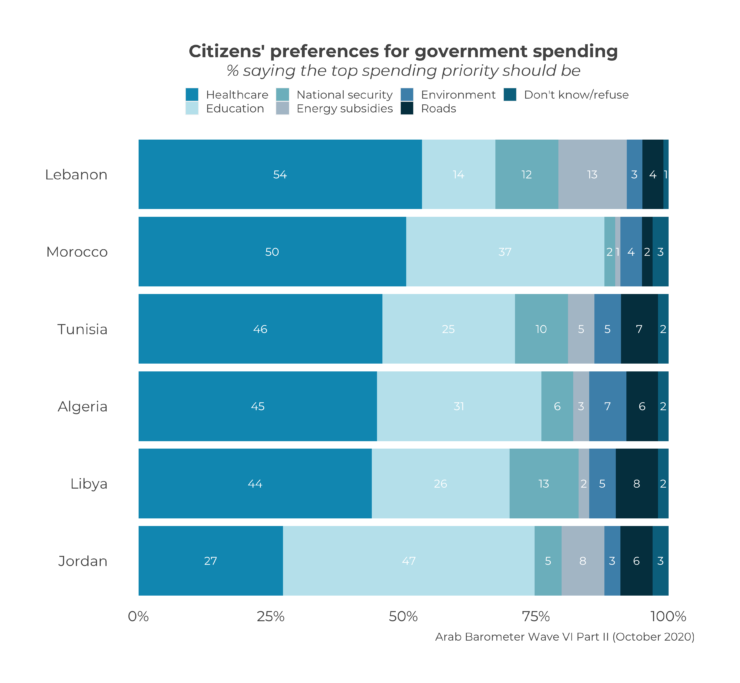
Regardless of how citizens in surveyed MENA countries view their healthcare systems, there is a unanimous call for governments to devote more attention to this sector. With the exception of Jordan, a popular regional destination for medical tourism, the plurality (or outright majority in the case of Lebanon) in surveyed MENA countries report that the healthcare system should be the top priority their governments in the next fiscal year, beating out education, national security, environmental issues, roads and transportation, and subsidies on energy. The shares wanting to increase spending on healthcare range from 44 percent in Libya to 54 percent in Lebanon.
With the ongoing distribution of the vaccine underway, the health-related concerns about COVID-19 will likely begin to give way to other problems the pandemic has tilled, namely economic stagnation and stilted education. But the performance of governments will not be forgotten, and appraisals do not automatically rebound once the health crisis subsides.
As of this writing, the final surveys that comprise Part III of Arab Barometer Wave VI are in the field, with the exception of one country where fielding has completed: Tunisia. While concern over the spread of COVID-19 has cooled from 79 percent in October 2020 to 56 percent in March 2021, appraisals of the healthcare system and pandemic response still go hand in hand. Both have slightly risen again to just over 30 percent—still a minority share. Regional governments would do well to remember that legacies of inaction or incompetence die hard; every life stolen by COVID-19 is remembered by multiple others who question whether things might have turned out differently.
